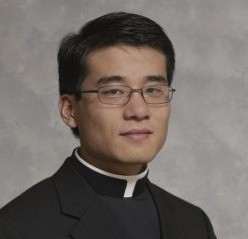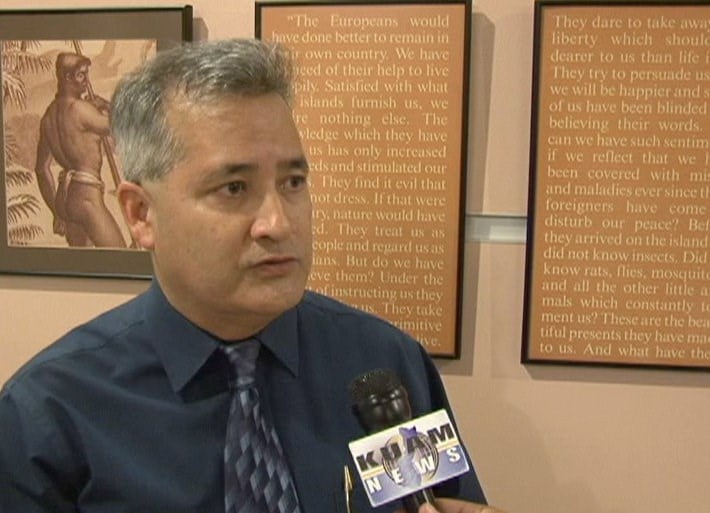An anonymous commenter asked to post the Archdiocesan Internal Review Report of the Cathedral-Bascilica and the Catholic Cemeteries, which can be found here and in the Archdiocese of Agana website. The report was conducted on January 23, 2015 and listed the following:
(1) Msgr. Benavente as the administrator of the Cathedral-Basilica and The Catholic Cemeteries developed projects which resulted in the Archdiocese incurring $7 million dollars ($7,029,853.93), which were consolidated in 2009 from different loans held at the Bank of Hawaii and Bank of Guam to First Hawaiian Bank, and re-financed again in 2012. These two entities have the largest indebtedness of all other entities in the Archdiocese, and in 2013, a review of the principal balances indicated that the overall reduction of their indebtedness was less than the average 20% reduction by other Archdiocesan entities. Another project that was formerly administered by Msgr. Benavente is indebted for $2.2 million dollars as of 2013, and due to its financial condition has only been paying interest on its outstanding debt, up to August 2014. These three entities constitute approximately 37% of the total indebtedness of the Archdiocese (the remaining indebtedness represents all parishes and catholic schools).
(2) Msgr. Benavente as the administrator of the Cathedral-Basilica and Catholic Cemeteries commingled funds and transferred funds between the two entities without respect of restrictions on funds - i.e. cemetery funds were used for payroll of Cathedral-Basilica employees; monies restricted to stipend payments for the clergy were used to pay for loans; also, a pervasive practice was evident in the reimbursements for personal credit card payments - these practices resulted in extremely difficult record keeping, failure to apply generally accepted principles of accounting, and most importantly making verification and audit by auditors impossible.
(3) Between January 2009 and July 2014, Msgr. Benavente received payments of $326,913.61 by simultaneously drawing payroll and stipends from The Catholic Cemeteries, and stipend payments from the Cathedral-Basilica. Upon the change of administration, credit cards in the name of the Archdiocese were discovered holding balances in excess of $60,000; the credit card in the name of The Catholic Cemeteries was specifically used by Msgr. Benavente for restaurants, air fare, the Shangri-La Hotel in Manila and other five star Hotels. In the same period, The Catholic Cemeteries and the Cathedral-Basilica expended more than $123,000 towards credit card payments to First Hawaiian Bank and American Express. Other payments for a credit card in the name of Msgr. Benavente, a gas card, and cellular/data phone privileges, which were paid for by The Catholic Cemeteries, accounted for an additional $23,000. Notably, $13,000 of cemetery funds were paid for Msgr. Benavente's 20th Anniversary reception. Total advances documented between January 2009 and July 2014 by both entities for Msgr. Benavente are nearly $475,000. This does not include cemetery family crypts valued at $380,000.00, which were gifted by Msgr. Benavente to his close friend and family; in other words, no fee was charged for these cemetery plots.
(4) Under the prior administration, $400,000 in past due obligations for the Cathedral-Basilica and The Catholic Cemeteries accrued; the past due obligation is of July 25, 2014, and does not include the $7 million dollar obligation owed to the First Hawaiian Bank. For the Cathedral-Basilica, $188,000 of the past due obligations are for insurance premiums, and the monthly income generated by the Cathedral-Basilica is insufficient to pay for both past due and current insurance premiums, utility and other expenses, and bank loans. The current financial condition of the Cathedral-Basilica is in the red. Notwithstanding its financial condition, Msgr. Benavente granted education scholarship for tuition, substantial donations for medical assistance, employee loans, and other donations from parish funds. Another $27,000 of parish funds were used to pay for Msgr. Benavente's projects involving the Knights (papal honors).
(5) Deloitte & Touche on January 8, 2014, notified the Archdiocese that The Catholic Cemeteries was not auditable due to significant accounting deficiencies. One of the issues identified was the long-term care (aka perpetual care) liability, which was not accurately reflected in the financial statements, nor was it property allocated in its records; specifically, prior sales were recorded as revenue rather than setting aside any portion for long term care. Despite the passage of more than six months from the report, no progress was noted to address this major issue; nor was there any set funds set aside and designated as perpetual care funds to conform to the recommendation; the Deloitte & Touche report showed a liability of $800,000 in long term care which during 2013 grew to more than $1.3 million. Since the change of administration, the Perpetual Care Fund has been established with an approximate balance of $30,000, in just a few short months.
Guam - Redemptoris Mater Seminary Board of Directors member Dr. Ricardo Eusebio says he does not trust the ad hoc committee report on the RMS issued by Father Jeff San Nicolas yesterday. Dr. Eusebio says the report was prepared by a committee that is biased.
 Dr. Ricardo Eusebio is a surgeon, a member of the neocatechumenal way, a member of the group I Familian Mangatoliku Siha Para Si Apuron or Catholic Families for Apuron and a board member of the Redemptoris Mater Seminary.
Dr. Ricardo Eusebio is a surgeon, a member of the neocatechumenal way, a member of the group I Familian Mangatoliku Siha Para Si Apuron or Catholic Families for Apuron and a board member of the Redemptoris Mater Seminary.
We met with him today to get his reaction to Father Jeff San Nicolas' statement yesterday in which Father San Nicolas connected for the first time Archbishop Anthony Apuron to the neocatechumenal way. Dr. Eusebio says he has no response for such allegations from Father San Nicolas. But he does have a few words to say about an ad hoc committee report Father San Nicolas released to the media yesterday despite orders from his superiors not to do so.
The report is on the RMS and is 141 pages long. It confirms some of the suspicions many have had about the Yona seminary's practices and its strict ties to the neocatechumenal way.
"I don't think the people in that committee have in their best interest the Redemptoris Mater Seminary. I think their interest is to close the seminary and I think their interest is to make the seminary look bad. So why would I listen to a report in which the members forming an opinion in the report are biased?"
Although Dr. Eusebio admits he has not had a chance to read the full report, he responds to some of the allegations contained in it. For example, the report states that the RMS purports to follow on paper the Program for Priestly Formation when considering incoming seminarians, but by practice, they don't follow the PPF guidelines. As a result, “A major consequence of an inadequate evaluation process calls into question the quality, accuracy and overall integrity of any evaluation decisions which subsequently may lead to the progression of candidates to ordination who are not ready and do not meet the standards and expectations articulated in the PPF, nor have the concurrence of the faithful."
"The seminary has ordained 17 priests. Are you telling me that the 17 priests are not worthy of being priests? Are you telling me that Father Miguel who is completing his Ph.D in Rome is not an adequate priest? Are you telling me that Father Alberto who sits in the chancery, who is appointed by Archbishop Hon to be there is not an adequate priest?" questioned Dr. Eusebio.
Dr. Eusebio also points out that the seminary is accredited differently and therefore their educational standards will be different.
"The seminary here in Guam is one that is accredited by the Lateran University and so follows a different sort of path than somebody who is accredited by a university in the United States," he pointed out. "It's not like somebody enters the seminary at one stage and then four years, five years, six years, eight years later are ordained. For some it's 10 years, for some it's 15 years. It depends. It depends on their maturation. It depends on their spiritual formation."
Meanwhile, Dr. Eusebio also defended Archbishop Anthony Apuron, noting that proclaiming Apuron guilty is premature at this point in time.
"Even a criminal who has committed a crime, is accused of a crime in the court system is deemed innocent until proven guilty. Yet here we have the presbyteral council, Father Jeff assuming that Archbishop Apuron is already guilty and that he should be removed? I think it's a shame," he said.
PNC: "Do you have an opinion yourself on the innocence or guilt of Archbishop Apuron?"
"I think he's innocent until he's proven guilty. That's the right thing to think."




